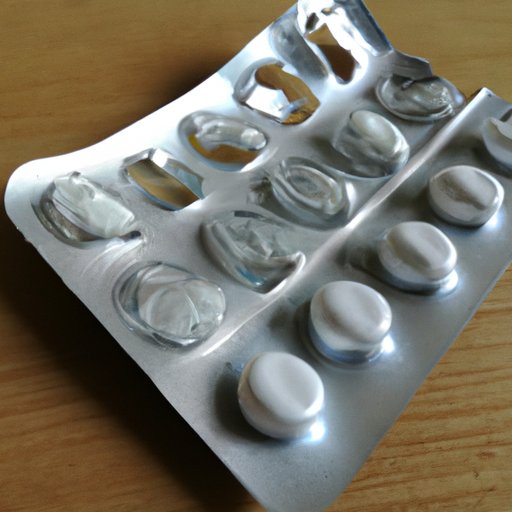Introduction
When it comes to medication, efficacy and safety are of the utmost importance. Proper use and disposal of medication are critical for avoiding negative consequences and promoting good health. Unfortunately, many people overlook the importance of paying attention to expiration dates and proper storage. This can lead to unnecessary health risks and potentially harmful consequences. In this article, we’ll explore the many risks of taking expired medicine, and provide guidance for ensuring safe and effective medication use.
Expired Medicine: The Hidden Dangers Lurking in Your Medicine Cabinet
The risks associated with taking expired medication are significant. Some medications break down over time and can become toxic. Others may lose their effectiveness, making them useless for treating specific conditions. Common household medications such as pain relievers, allergy medicine, and vitamins can all have potential adverse effects when expired. What’s more, many people still fail to dispose of expired medication properly. In fact, statistics show that improper disposal and use of expired medicine are widespread issues that can have serious consequences.
Don’t Gamble With Your Health: What Really Happens When You Take Expired Medication
Expired medication can have a significant impact on the body, and it’s crucial to understand why. When medication expires, it can become toxic and cause harmful reactions. According to experts, the chemical makeup of a medication can change as it ages, resulting in potentially dangerous consequences when ingested. Some of the possible consequences of ingesting expired medication include adverse side effects, allergic reactions, and even poisoning.
A Closer Look at Expiration Dates: What Happens When You Ignore Them
The expiration date on a medication label is there for a reason, yet many people ignore it. Understanding what it means is critical to proper medication use. Expiration dates are determined through extensive testing, with manufacturers determining how long a medication will remain potent and safe based on factors such as temperature, humidity, and exposure to sunlight. Examples of the consequences of ignoring expiration dates include ineffective treatment, reduced potency, and potential illness or injury.

Spoiled to the Core: The Risks of Taking Expired Medicines
As medication ages and deteriorates, changes occur in the substance that carry potential negative effects if ingested. Specific categories of medication are most dangerous when expired, including antibiotics, insulin, and eye drops. When these medicines are past their expiration dates, they can lose their effectiveness, become toxic, or create other dangerous conditions. The risks associated with taking expired medication are significant, and best practices for avoiding them should be common knowledge.
Knowledge is Safety: Exploring the Risks and Consequences of Expired Medication Use
To avoid the risks associated with taking expired medication, it’s critical to store medication properly to maintain potency and safety. This means keeping medication in a cool, dry place away from direct sunlight. Proper disposal is also essential for avoiding potential harm to oneself and others. Tips and guidelines for safely disposing of expired medication include taking unused medication to a pharmacy or community program that accepts them. Improper disposal can have both legal and ethical consequences, and it’s essential to follow guidelines to ensure safe and responsible disposal practices.
Expiration Dates Demystified: The Truth About Taking Expired Medicines
There are many myths surrounding medication expiration dates, but the truth is that they’re there for a reason, and ignoring them can have serious consequences. It’s important to follow expiration dates and proper medication disposal guidelines to avoid potential harm to ourselves and others. If you’re unsure of what to do with expired medication, it’s essential to seek advice from a healthcare professional or pharmacist.
Expired Medicine 101: Understanding the Risks and Knowing When to Toss Your Meds
Proper use and disposal of medication are critical for avoiding negative consequences and promoting good health. To ensure safe and effective medication use, it’s important to follow best practices such as paying attention to expiration dates, storing medication properly, and safely disposing of expired medication. Key best practices include taking medication only as prescribed, examining all medication carefully before use, and identifying expired medication. By taking these steps, we can avoid the risks and consequences of taking expired medication.
Conclusion
Proper use and disposal of medication are critical for avoiding negative consequences and promoting good health. The risks of taking expired medication are significant, and it’s essential to follow best practices to ensure safe and effective medication use. By paying attention to expiration dates and storing and disposing of medication properly, we can avoid potential harm to ourselves and others. As we conclude this discussion, let’s encourage one another to share this information with others and to take the necessary steps to ensure the safe and effective use of medication.
